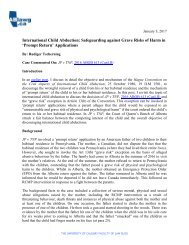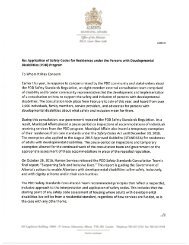In This Issue
click
click
Create successful ePaper yourself
Turn your PDF publications into a flip-book with our unique Google optimized e-Paper software.
scale your action to something you can<br />
begin now. Clarify your role and the<br />
steps you can take, using the principles<br />
of learning from history, developing<br />
leadership (including your own), and<br />
maintaining accountability as guides.<br />
Is the first step educating others so that<br />
you have a shared language to communicate<br />
as you move forward? If you<br />
have that foundation, is your role to<br />
organize a group to take the next steps?<br />
Does your organization not recognize<br />
the concern? If so, your role may be to<br />
engage in productive activism to draw<br />
attention to the issue. Note that activism<br />
does not need to be confrontational,<br />
and certainly not hostile. You are working<br />
for an awesome vision, not against<br />
people or institutions.<br />
You Can’t Do It Alone. Identify<br />
partners, allies, and people whose support<br />
you need to achieve the vision.<br />
Figure out how you will access these<br />
people and what you will need to do<br />
to gain their trust and partnership. The<br />
principles of networking and gatekeeping<br />
are helpful here. Some of those you<br />
meet in this process will already be active<br />
in their own endeavors. Make sure<br />
your actions support and enhance, not<br />
detract from or compete with, theirs.<br />
There Is Different Work for Different<br />
People in Your Group. Analyzing power<br />
and sharing culture are important as<br />
your group comes together to understand<br />
social and organizational culture<br />
and manifestations of racism. As the<br />
members of the group build trust, their<br />
different histories and culture emerge<br />
and they will clarify how their work<br />
will be different. It is not unusual for<br />
internalized racial oppression, both<br />
superiority and inferiority, to become<br />
central here, and it is important to identify<br />
challenges in working together and<br />
plan for what can be done to address<br />
concerns.<br />
Develop and Nurture Systems of Accountability.<br />
Networking will broaden<br />
your base, and it will likely bring you<br />
closer to leaders who can make change<br />
in the organization. Meaningful change,<br />
however, requires accountability to<br />
communities of color and open communication<br />
with them to continually<br />
assess the strength and viability of your<br />
partnerships. Since diverse groups of<br />
people of color are often not represented<br />
among agency leaders, accountability<br />
structures must be developed<br />
inside and outside the organization’s<br />
hierarchy.<br />
You Don’t Need Critical Mass; You<br />
Need Gatekeepers Who Can Open Up a<br />
System. Effective organizing requires<br />
that you analyze the power structure<br />
and identify gatekeepers for the systems<br />
you are working to benefit, and that<br />
you use your own gatekeeping power<br />
productively. Develop allies outside of<br />
your organization who can guide and<br />
support you. Use allies’ help to figure<br />
out how you can access people in<br />
power and bring those in power closer<br />
to the group to whom you are accountable<br />
so decisions about change can be<br />
made collaboratively.<br />
Thank you to those who have<br />
thoughtfully read our columns, those<br />
who “liked” us (and those who didn’t!),<br />
and especially to those who are using<br />
our experience to move your antiracist<br />
work forward.<br />
References<br />
<strong>In</strong> solidarity,<br />
Mary, Sandy, and Lisa<br />
Blitz, L. V., Pender Greene, M., Bernabei,<br />
S., & Shah, V.P. (2014). Think creatively<br />
and act decisively: Creating an antiracist<br />
alliance of social workers. Social Work,<br />
59(4), 347-350. Available online at: http://<br />
sw.oxfordjournals.org/content/early/2014/07/31/<br />
sw.swu031.short<br />
Blitz, L. V., & Pender Greene, M. (Eds.).<br />
(2006). Racism and racial identity: Reflections<br />
on urban practice in mental health and social<br />
services. New York: Haworth Press. Peer<br />
reviewed, published simultaneously as a<br />
double edition of the Journal of Emotional<br />
Abuse, 6(2/3).<br />
Carten, A. J., Siskind, A. B., & Pender<br />
Greene, M. (2016). Strategies for deconstructing<br />
racism in the health and human services. New<br />
York, NY: Oxford University Press.<br />
Mary Pender Greene, LCSW-R, CGP, is an<br />
organizational consultant, psychotherapist<br />
in private practice, career/executive coach,<br />
professional speaker, and co-founder of the<br />
AntiRacist Alliance.<br />
Sandra Bernabei, LCSW, is President of<br />
the National Association of Social Workers—<br />
New York City Chapter. She is a founding<br />
member of the AntiRacist Alliance.<br />
Glenn Martin of JustLeadershipUSA was the keynote speaker at the NASW New York City<br />
chapter conference of the profession in April 2015. Photo credit: Sandra Bernabei.<br />
Lisa V. Blitz, Ph.D., LCSW-R, is a social<br />
worker, researcher, and educator with 25<br />
years of experience in mental health and social<br />
justice centering on culturally responsive<br />
trauma-informed practice and organizational<br />
development.<br />
The New Social Worker Winter 2017 29




